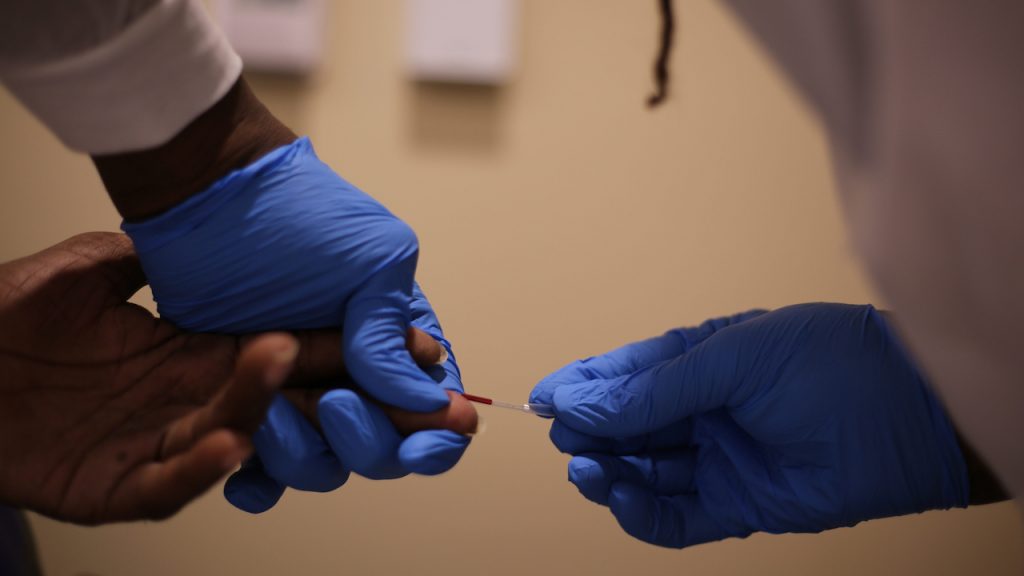COVID-19 Adds Anxiety, Fear For HIV-Positive Patients
COVID-19 poses no greater risks for HIV/AIDS patients who are properly medicated. But the social anxiety and further stigmatization is exacerbating existing issues.

The COVID-19 pandemic has added a layer of fear for those managing pre-existing conditions in Michigan.
“If you look at the HIV patient, a lot of them are very vulnerable. COVID-19 has amplified a lot of those things.” — Dr. Peter Gulick, Michigan State University
Dr. Peter Gulick is a viral infectious disease specialist at Michigan State University who directs four HIV/AIDS clinics across the state. He became involved in this work in 1983, just as the AIDS epidemic was taking hold, and says he sees parallels with the level of uncertainty caused by COVID-19.
“There was a lot of fear and a lot of anxiety, until we got to understand how it wasn’t as easily transmitted,” Gulick says.
Gulick currently treats over 1,000 HIV-positive patients in Michigan under the federal Ryan White HIV/AIDS funding program. The U.S. Department of Health and Human Services pumped $90 million into the program in April to deal with increased case work — including more than $1.4 million for Michigan providers.
He says when properly treated, HIV-positive patients are at no greater risk of contracting COVID-19, but that his patients are suffering from isolation and further stigmatization during this time.
Click on the player above to hear Dr. Peter Gulick on the impact the COVID-19 pandemic is having on Michigan’s HIV/AIDS population, and read a transcript, edited for length and clarity, below.
Shiraz Ahmed, 101.9 WDET: What kind of concerns are you hearing from your patients and others in the HIV/AIDS support community?
Dr. Peter Gulick, Michigan State University: Regarding the HIV virus, it’s extremely important that they take their medicine so they stay virally-suppressed and keep their immune systems healthy. As long as they’re virally-suppressed, as long as their immune systems are healthy, they’re risks are no greater than somebody that is HIV-negative. I try to educate them, because there’s a lot of fear in the community that because of HIV they’re going to be at extremely higher risk of getting the COVID-19.
So what sort of impact have you seen on the community thus far?
If you look at the HIV patient, at the type of patient they are, many of them have come from really damaged social-economic environments. Many of them have severe mental health issues, many of them have substance abuse issues. A lot of them are very vulnerable. All these different things were present before, but now COVID-19 has amplified a lot of those things.
When I talk to them, probably the biggest thing they’re fearful of is the isolation, and they feel depressed and they feel anxious.
One thing we’re hearing is about the disproportionate impact of COVID-19 on an African American-majority city like Detroit. Do you see that also playing out with the specific African American HIV/AIDS population in the area?
They’re looking at all the different factors that could be causing this in the African American population, a lot of it’s related to the co-morbid diseases they have: the diabetes, the hypertension, the heart disease, the COPD, things that aren’t being controlled and they don’t have accessibility many times to medical providers to give them care. That’s something we are very cognizant of in our population. Fifty percent of our HIV patients are now over the age of 50, the good news is they’re living longer, but then they have a lot of co-morbid diseases. But we provide primary care for them as well through Ryan White, so we don’t just give them their HIV drugs; the diabetes, the hypertension, we’re trying to make sure those are as controlled as possible too.
Trusted, accurate, up-to-date
WDET is here to keep you informed on essential information, news and resources related to COVID-19.
This is a stressful, insecure time for many. So it’s more important than ever for you, our listeners and readers, who are able to donate to keep supporting WDET’s mission. Please make a gift today.
